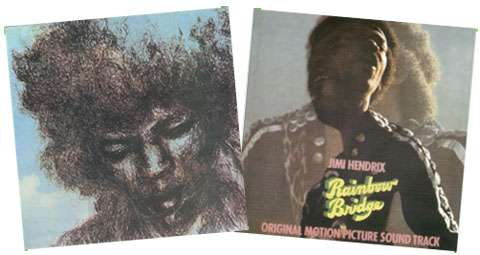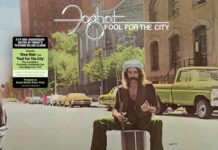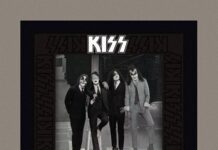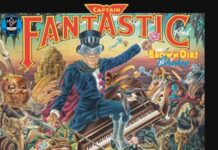A strange thing happened after Jimi Hendrix passed away in 1970: A slew of albums with unreleased material started jamming the record bins. Certainly, there have been more posthumous albums than those that Hendrix himself recorded and oversaw. Janie Hendrix, who heads up Experience Hendrix, has said there’s still more to come, although the well hasn’t sprung much lately. So, why not revisit the first two releases that emerged the year after Hendrix stepped off the planet — The Cry Of Love and Rainbow Bridge. While many of these tracks are on 1995’s Voodoo Soup and 1997’s First Rays Of The New Rising Sun, this is the first time these two 1971 albums have been issued on CD.
The Cry Of Love and Rainbow Bridge were both assembled by Hendrix engineer Eddie Kramer and drummer Mitch Mitchell, much of the music was recorded by Hendrix for a double album called First Rays Of The New Rising Sun (the 1997 version is reportedly more in line with the guitarist’s vision). As with many of Hendrix’s ideas and concepts, others intervened and two separate albums were released, largely to capitalize on the late guitarist’s emerging afterlife legacy. All politics and red tape aside, both albums exhibit a new direction, a new-found freedom for the guitarist to explore beyond the Experience (even though both Mitchell and, to a lesser extent, Noel Redding, make appearances). His stint at Woodstock, which featured Mitchell, bassist Billy Cox, percussionist Juma Sultan, and others, foreshadowed where things were going. Once he got into Electric Lady Studios to lay down tracks, Jimi Hendrix had a pretty good handle on where he wanted to take his music next.
There’s no denying the fluid looseness of “Freedom” — even more so on “Drifting.” Clearly, Hendrix was more inclined to add more musicality to the songs, beyond just his own guitar — you’re hearing vibes, keys, and lots of layering. “Ezy Rider” has a salsa backbeat and probably could have been a hit, while the more bluesy and mystical sojourns like “Night Bird Flying,” “My Friend” and the groovy “Astro Man” conjure up images of bean bag chairs and black-light posters. At the end of the day, the gem of The Cry Of Love is probably “Angel,” arguably one of Hendrix’s most eloquent ballads. Rod Stewart covered ‘Angel” in 1972, but he didn’t quite match the intensity that Hendrix brought to the song.
Rainbow Bridge, the second 1971 Hendrix release, is billed as the soundtrack to the film of the same name, although none of the music is in the film. Nevertheless, it lifts off easily with another loose and delightful “Dolly Dagger.” One of the most captivating songs is “Room Full Of Mirrors,” which floats on a bed of guitars and percussion, a soulful rhapsody soaking in hard rockin’ rhythm and blues. The overdubs and greasy wheels on “Star-Spangled Banner,” while fascinating in some respects, doesn’t quite resonate with the same will and testament that Hendrix brought to his performance at Woodstock. That rarefied rawness is saved for the 11-minute live version of “Hear My Train A Comin'”
The Cry Of Love and Rainbow Bridge were the first of a string of posthumous releases handled by various parties. This probably means we’ll be seeing CDs of War Heroes, Loose Ends, Crash Landing and Midnight Lightning at some point. After that, who knows what’s left in the vault. Chances are, with films and other projects underway, and new generations feeling the buzz, we’ll be seeing a lot more of Jimi Hendrix — seemingly more than ever before.
~ Shawn Perry




















